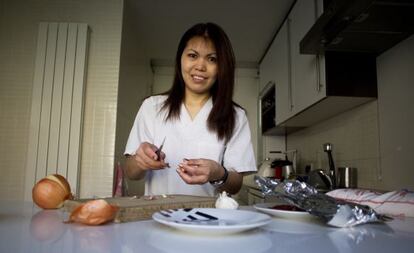New legal broom for domestic service
Since January 1, household cleaners must contribute to Social Security Reluctance to register persists among mainly immigrant workers

"Please, Clemen, today could you change the sheets and towels in the guest room - my brother-in-law is coming for a couple of days."
Clementina, 41, from Asturias, a domestic employee, does these tasks as well as washing, ironing and sweeping. She lives in the outlying district of Móstoles, and gets up every morning at 6.30am. The bus she takes only runs every 20 minutes and she can't miss it, or she will be late. Clemen, as she likes to be called, is not registered in the Social Security system - not because her employers refuse to cooperate, but because she prefers "not to pay in." That way she takes home the whole of the 800 euros she gets for 25 hours a week.
"Some weeks ago, my boss told me we'd have to make a written contract, under the new law, to regularize my situation and register me with Social Security." Clemen is reticent about this development, since she holds two taxi licenses from her deceased husband, which she rents out, and is recognized as a self-employed worker. "So, with the new law, I'll get less, won't I?" Her question strikes at the heart of this difficult issue. On January 1 the new legal job status of domestic employees took effect. These employees are numerous and many are unaware of the new rights and obligations. But both they and their employees have until July 1 to regularize their situation.
Nadia, 48, a Ukrainian, is an example of the cases denounced by associations such as the Basque ATH-ELE household workers' organization. Nadia came to Spain two years ago, traveling by bus from her native town, Lipsky. She works as a cleaner in Madrid. "I am not registered with Social Security, because I don't have papers," she says. Immigrants do most of the domestic cleaning jobs in Spain, and many of them lack documentation.
So, with the new law, I'll get less money, won't I?"
Betzaide, a Philippine woman of 34, is the other side of the coin. She has been in Spain for four years, has all her papers in order and is registered with Social Security. "My pay is 850 euros a month, for eight-and-a-half hours a day." Betzaide hasn't read the new law, and has been lucky not to need it.
In Spain some 700,000 people serve in private homes, according to the Active Population Survey (EPA). Of these, 300,000 contribute to Social Security. Of the rest, only 90,634 have signed up under the new law. In other words, more than half are still being paid under the counter.
Domestic employees now contribute like any other wage-earner to Social Security. According to a former labor minister, the Zapatero government wished to "dignify" a profession whose legal framework had not changed since 1985. The change brings more rights. For the first time, domestic employees will have coverage in the case of a work accident. If they are ill they will get sick leave starting on the fourth day, instead of the 29th. The employee will contribute from the first moment, regardless of the hours worked per week. Also, the wage will be adjusted to the Consumer Price Index, with a right to receive the inter-professional minimum wage (641.40 euros). In the case of domestic employees working by hours, the employee must be registered in each of the homes in which she works. Non-complying employers may face fines of up to 3,000 euros.
The new law establishes that these employees must have a written contract, signed by both parties, stipulating the minimum wage, the rate of pay, the number of hours worked weekly, wages paid in kind and the bank account number of the householder where the employee works. The Social Security contribution for 2012 is 22 percent of the employee's wage, 18.3 percent being borne by the employer and 3.7 by the worker. Such conditions are usual in countries like France, Sweden or Germany, but are proving a novelty in Spain.
Tu suscripción se está usando en otro dispositivo
¿Quieres añadir otro usuario a tu suscripción?
Si continúas leyendo en este dispositivo, no se podrá leer en el otro.
FlechaTu suscripción se está usando en otro dispositivo y solo puedes acceder a EL PAÍS desde un dispositivo a la vez.
Si quieres compartir tu cuenta, cambia tu suscripción a la modalidad Premium, así podrás añadir otro usuario. Cada uno accederá con su propia cuenta de email, lo que os permitirá personalizar vuestra experiencia en EL PAÍS.
¿Tienes una suscripción de empresa? Accede aquí para contratar más cuentas.
En el caso de no saber quién está usando tu cuenta, te recomendamos cambiar tu contraseña aquí.
Si decides continuar compartiendo tu cuenta, este mensaje se mostrará en tu dispositivo y en el de la otra persona que está usando tu cuenta de forma indefinida, afectando a tu experiencia de lectura. Puedes consultar aquí los términos y condiciones de la suscripción digital.








































